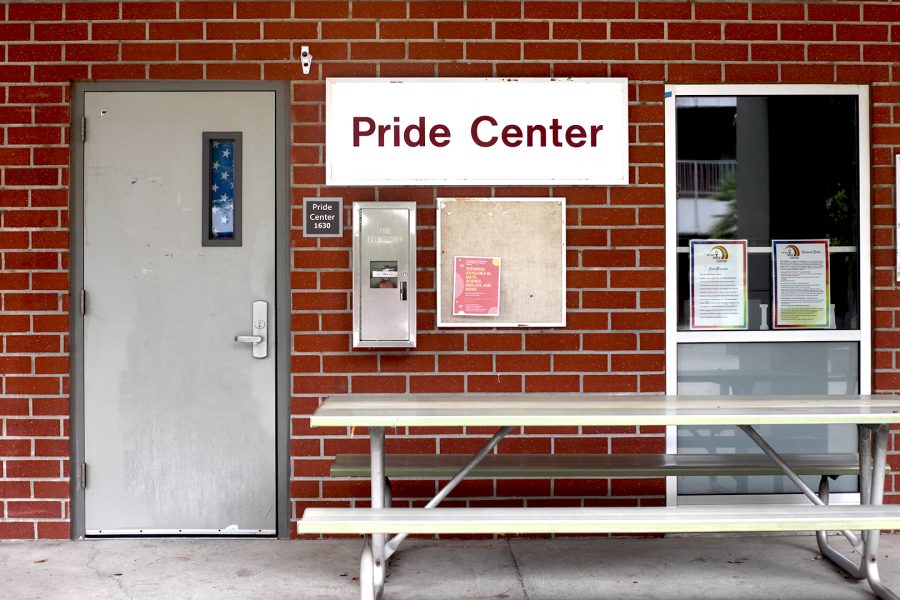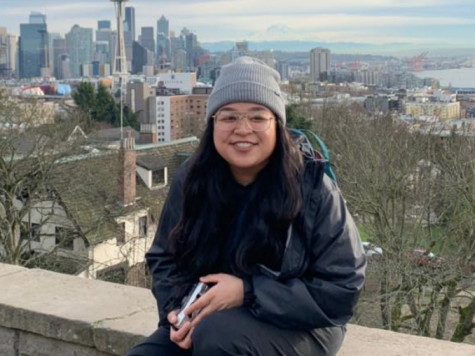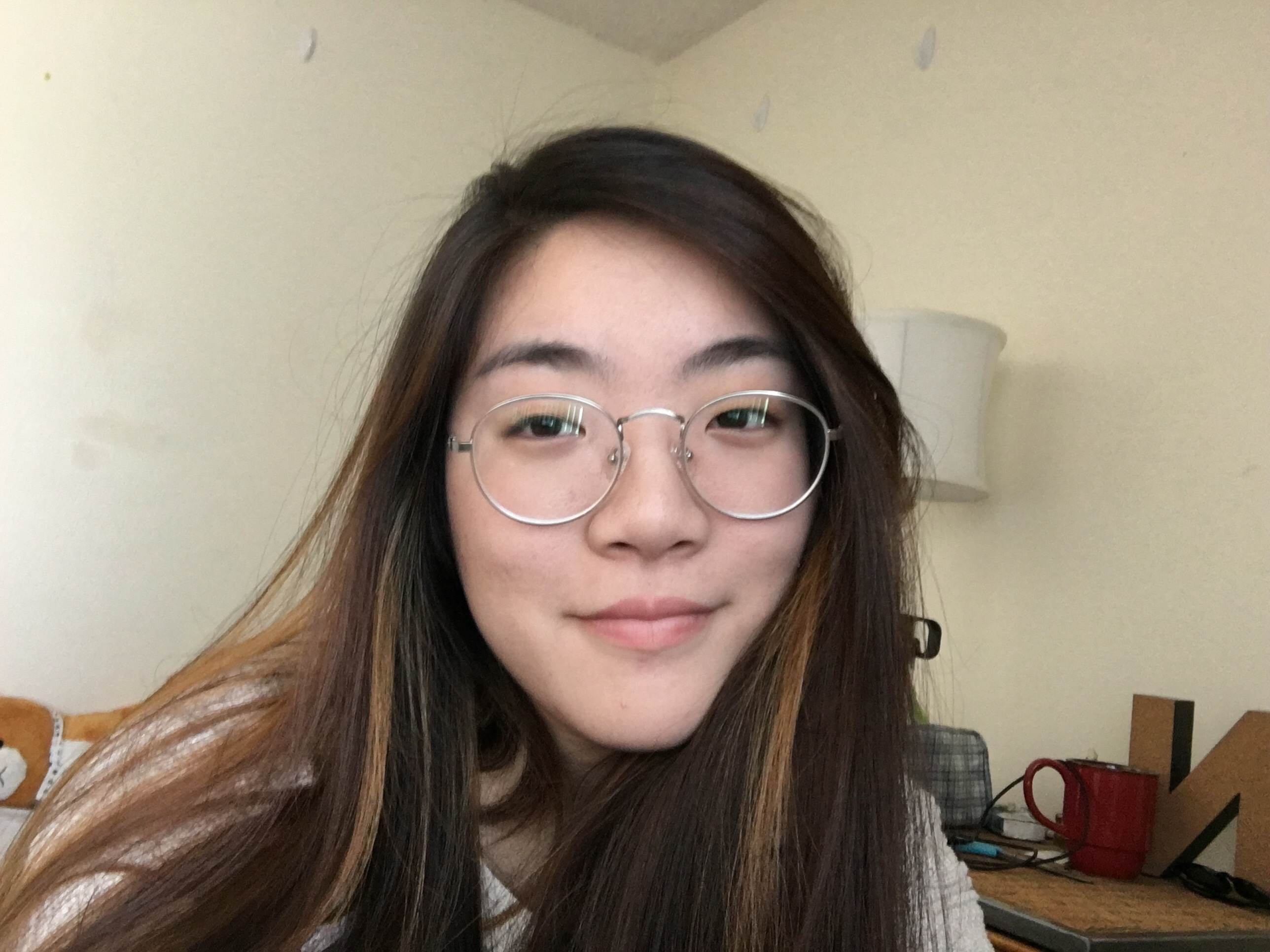For queer students, a rainbow flag has been a hallmark of building 26.
The queer community of Mt. SAC is now seeing more advocacy for the improvement of their own resources through an expansion of the Pride Center.
Yet with the Pride Center seeming to have internal conflicts of its own and since LAMBDA has now been deactivated for the spring, it seems likely that the community is encountering problems in the spaces they go to for support.
The Pride Center, with its queer pride flags on display inside, opened at Mt. SAC in 2016. This was a move that was celebrated, according to Kimberly Earhart, the center’s first coordinator.
“Students were overjoyed with the Center,” Earhart said. “One of the first things that I put up was a huge Post-it with the question: what does the Pride Center mean to you? The comments were both heartbreaking and heartwarming, but overall it was about the center being a welcoming place.”
In the past, however, the center has faced problems surrounding members who have not followed guidelines or respected the safe space the Pride Center aims to be.
Nayelic Mejia, 19, is an animation major who was in LAMBDA in her first semester at Mt. SAC and now spends time in the Pride Center. Mejia said that she has heard of instances in which people were banned or simply did not want to come anymore.
“I heard that some people didn’t want to be in the Pride Center anymore because their feelings weren’t like, respected,” she said.
According to Mejia, someone was recently banned from the Pride Center for an incident in which a student worker asked them to relax amidst a heated conversation.
“They kind of ignored the student worker and disrespected the student worker,” Mejia added.
Daena Acevedo, 22, is another regular in the center.
She said that some students have to think before they speak.
“There are times where some people have harsher language, and they don’t take [into] consideration how that might affect others,” Acevedo said.
Mejia also added that on occasion, some students do not talk about issues in the center when they emerge “because some people say, ‘Oh, it’s not that important.’”
Although the two have seen problems arise among the students, they both said that they see the Pride Center as a safe space for them.
As of now, the Pride Center can house up to 17 people within its space, according to current Pride Center Coordinator Melinda Bowen.
Despite this capacity, Bowen said that she regularly sees the center filled with about 55 to 75 people, which concerns her.
“Sometimes it’s so, so full that students don’t come in,” Bowen said. “If it’s a first-time student who really needs our services, for instance, maybe something has happened at home and they feel distraught, they might need housing, they may have a food insecurity, they may just need a professional to talk to… other students that are in their situation may not feel comfortable coming in because it’s so crowded.”
The Pride Center currently has a bench placed outside of it in order to give students a place to sit if the center is over capacity.
Acevedo said the size of the center sometimes causes irritation, “I feel like that depends on the day. I mean, if anyone is trapped in a room for long enough.”
Bowen also expressed concerns about privacy becoming an issue if a student has a session with the center’s resident therapist.
This type of concern has reached beyond just the staff and students.
Senate Chair of Mt. SAC’s Associated Students, Jacob Duarte, brought the issue up in an Academic Senate meeting, where Duarte said that he and Publicity Senator Jessica Heredia worked to create a resolution for an expansion of the center, “because we thought the students of the LGBT community were getting a disservice.”
“With such a small space, I feel like as a campus, it’s important for us to cater to the groups that are here and giving that population of space so small. It just did not feel right,” Duarte added.
According to Duarte, the concern was brought up to him because of his friendship with Bowen. The two have spoke about the privacy of counseling sessions within the center, considering the size of the space.
In terms of creating a larger space for the queer students, he thinks that a new larger center would be built in the new Student Life Center. “But that isn’t getting built for another couple of years,” Duarte said. “In the meantime, it would be on the Board of Trustees to find a substitute space.”
Despite the potential problems with privacy and comfort, the location of the center is not a problem for Bowen.
More specifically, it is not in the newly-built Equity Center because of the way the center is run. The Equity Center was opened in March 2019 and houses the Arise, Aspire, Dream, and Reach programs, as well as offices and a computer lab, but not the Pride Center.
“The Pride Center is run a little bit different than the programs in equity. We are staffed by a faculty member versus a classified member,” Bowen explained. “I think initially, that was done because the sensitivities of the LGBT community, and often someone like myself who’s tenured can speak out with a lot more confidence and kind of nudge a little more than maybe someone who doesn’t have tenure, which is a beautiful thing.”
Bowen added that the privacy issue would still exist if the center was placed among the equity programs, making it so that it would be best as its own entity.
Acevedo disagreed.
“Almost all the other equity centers were given a bigger space, like they were kicked out of their old building and then put into a bigger space, but the Pride Center wasn’t. You’re just left in that little area,” Acevedo said.
Jay Chagolla, former LAMBDA president and another Pride Center regular, initially had said they would come forward with their own issues regarding the center, but they could not be reached after multiple attempts.
LAMBDA, a Mt. SAC club, was also focused on creating a community and support for the queer student population, but it deactivated for the spring semester when Chagolla announced that the club would be deactivating on Facebook.
In the post they issued the following statement:
“Hello, it saddens me to say that Lambda will not be activating this semester. We had a few officers who couldn’t make the time commitment anymore and not enough members to fill their spots. With only two officers left and the deadline coming up we have no choice but to not activate. We are extremely sorry and wish you all the best. If anyone is interested in helping the club out you can message us and/or me Jay Chagolla. If not we hope you all do amazing this semester and you can always reach out to us for anything!”
In a previous piece about the deactivation, Chagolla explained the importance of the center.
“We have people who are 17 [years old] coming to college for the first time, and they are barely figuring out they are queer, and their parents don’t know, and what do you do if they get kicked out?” Chagolla said.
When Chagolla posted about the club’s deactivation, several people commented offering help including Mt. SAC journalism professor Toni Albertson and former LAMBDA president Albert Serna.
Serna commented asking how he could help, but Chagolla did not reply in a comment. Ajana Orozco also shared in a comment that LAMBDA could share a booth with her club for Join-a-Club Week, to which Chagolla also did not respond in a comment.
Angel Smith, 22, also offered help to LAMBDA in a comment below the post and said that no one had contacted him about the possibility of helping.
“This was my first semester at this campus, and knowing that LAMBDA was deactivated was heartbreaking because I was really looking into it,” Smith said. “Mt. SAC is a very friendly campus, and I think that the deactivation of LAMBDA will affect the community to a certain point to where people might feel that the campus is not supportive of the queer community, but it is.”
Regarding the deactivation, Chagolla shared how much the program meant to them:
“I am extremely upset. LAMBDA has been my baby since I first became president—when I first became an officer,” Chagolla said.
Overall, Acevedo did not feel that the lack of LAMBDA’s presence for this semester would affect the community greatly.
“I mean, if it’s deactivated indefinitely, I do think that people will have a sense of invalidation. But if it’s just for a little while longer, I don’t think it will make too much of a difference,” Acevedo said.
Acevedo was LAMBDA’s former inter-club council representative and historian, and she said that although she was not close to Chagolla, they might have felt it was best to let the club deactivate and as such did not reply to offers for help. Acevedo added that following the deactivation, a lot of the club members still went to the Pride Center for a sense of community.
The Pride Center and LAMBDA have been separate entities since LAMBDA was reactivated in the 1990s, with both organizing different events, such as the Pride Center’s Lavender Graduation in May and LAMBDA’s marches and club meetings.
“I don’t think they were meant to be combined as one,” Acevedo explained. “I mean, I remember when sometimes the meetings were held at the Pride Center, but it wasn’t very often because they are two different things.”
Bowen provided more detail into why the two were kept separate from each other, saying that LAMBDA was student-run, but the Pride Center was based on the campus.
“We are two distinctly different things,” Bowen said. “When I first came here, the students were very clear that they wanted to keep the two separate.”
According to Bowen, the Pride Center is still very willing to provide support to LAMBDA in the case of its reactivation in the fall.
“You know, we are stronger together, and that’s not a cliche,” Bowen said. “When students stand together, their voices are powerful.”




